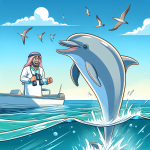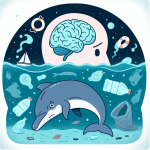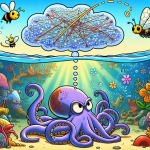
The Surprising Impact of Dolphins’ Health on Ocean Ecosystems
Our oceans teem with life and mystery, holding some of the planet’s most intriguing and intelligent creatures: dolphins. Recent alarming findings have opened our eyes to the declining health of these charismatic marine mammals. Researchers from Science Daily have revealed significant reductions in dolphin lifespans, prompting an urgent call for conservation efforts (Science Daily.)
The Silent Crisis: Dolphins Facing a Decline
Traditionally known for their cheerful demeanor and intelligence, dolphins in the North Atlantic are experiencing a troubling trend: their life expectancy is plummeting. Female dolphins now live an average of seven years less than they did in the 1990s. The root causes of this decline are multifaceted, involving bycatch deaths from fishing activities and cumulative environmental pressures, which have led to approximately a 2.4% decrease in population growth.
Unraveling the Impacts on Ocean Health
Dolphins play a crucial role in marine ecosystems. They are apex predators, maintaining fish populations and contributing to the ecological balance. A decline in their numbers can ripple through the oceanic food web, leading to overpopulation of certain marine species and declines in others. The intricate symbiosis among ocean inhabitants could be destabilized, affecting biodiversity and fishery yields.
Insights into Their Plight
The dramatic decline in dolphin populations has unveiled flaws in current wildlife management and conservation strategies. Existing counting methods for dolphin populations fail to account for the real-time impacts of environmental stressors. Adaptation of conservation measures, such as smarter fishing restrictions, is vital to prevent further decline.
‘Efforts to recover dolphin populations must include technological improvements in monitoring and enforcing sustainable fishing practices,’ noted marine biologist Dr. Maria Gonzalez.
Learning from Global Conservation Initiatives
Similar aquatic conservation success stories, like the resurgence of the green turtle populations (BBC) provide valuable frameworks. The recovery was a result of comprehensive international efforts, unknown decades ago, involving habitat protection, regulations on hunting, and community education. Applying these integrated approaches to dolphin conservation can provide innovative pathways to stabilize their populations.
Tackling the Challenges
Conservationists face significant hurdles in addressing this issue. Enforcement of bycatch reduction measures, habitat protection, and improved data collection will be crucial. Enhancing public awareness and encouraging participation in conservation initiatives are essential components of sustainable solutions. Given the global trend in climate change narratives, acknowledging its influence on oceanic ecosystems highlights the importance of climate-conscious conservation tactics.
Conservation as a Shared Responsibility
Together with the scientific community, national governments, and international bodies, we must commit to preserving marine biodiversity. With climate change exacerbating pressures on marine ecosystems, conservation efforts must be intensified to ensure the survival of dolphin populations.
In light of our findings, securing the welfare of dolphins is not only about saving a species. It is about preserving the intricate web of life that thrives below the waves, a testament to the balance upon which we all depend. As concerted actions take root, we can hope that dolphins will continue to grace our oceans, a symbol of a thriving marine ecosystem.



